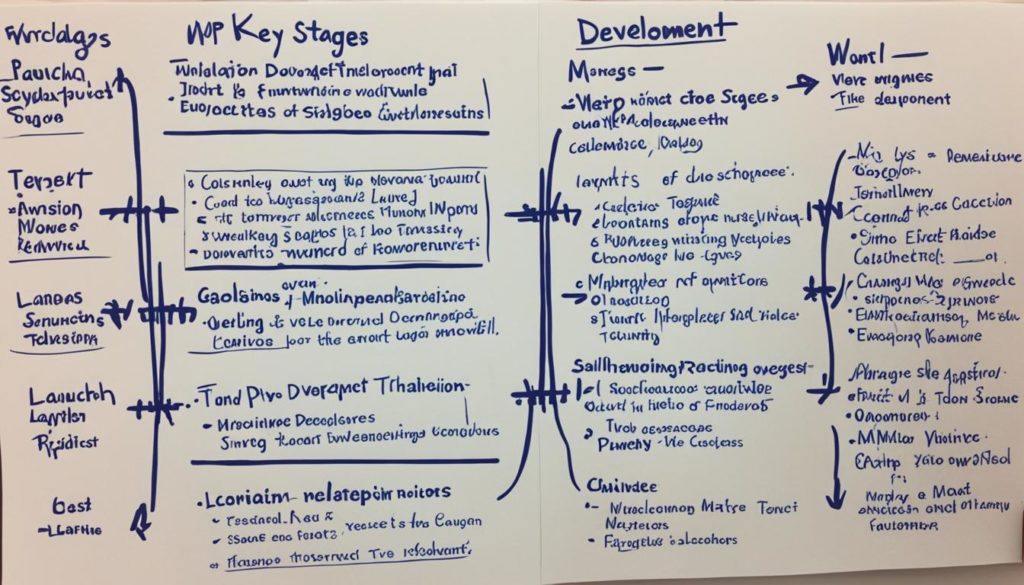
Did you know that by 2025, the global data sphere will grow to 175 zettabytes? This huge number shows how crucial data storage warehouses are becoming. The cloud has changed how we handle and use software, making it key for businesses. Yet, many are slow to move data storage solutions to the cloud. It’s time to rethink this approach.
In today’s world, making data-driven choices and using business intelligence tools are what set businesses apart. Cloud data warehouses offer big benefits. They let you access data easily, anytime, anywhere. This makes them vital for staying agile and competitive. By putting data storage in the cloud, companies can use their data fully. This turns data into insights that lead to better decisions and spotting trends early.
Moving to cloud storage isn’t just a quick change—it needs careful planning and design. Our cloud data warehouse is here to help you make this shift smoothly. We ensure your business gets the most out of cloud technology.
Key Takeaways
- The global data sphere is projected to expand to 175 zettabytes by 2025, emphasizing the need for advanced data storage solutions.
- Cloud data warehouse solutions enhance business agility and offer a competitive edge by providing easy access to data anytime, anywhere.
- Centralizing data on the cloud transforms raw data into actionable insights, leading to more informed decision-making.
- Despite the benefits, migrating to cloud storage requires a deliberate strategy and efficient architecture to maximize its potential.
- Our cloud data warehouse helps businesses seamlessly transition to and fully capitalize on the advantages of cloud technology.
Understanding the Benefits of Cloud Data Warehousing
The world of data storage has changed a lot, thanks to cloud data warehousing. This new way uses cloud computing to store data more efficiently than old methods. It lets companies save money and be more flexible.
What is a Cloud Data Warehouse?
A cloud data warehouse is a big place to store and manage data. It uses remote server access instead of one big server. This makes it easier to work with data and be more agile.
Advantages Over On-Preme Solutions
Cloud data warehousing has many benefits over old ways. You don’t need to spend a lot on hardware or upkeep. You can easily change how much you use, based on what you need. Plus, cloud data warehouses let you access data safely from anywhere.
Cost Efficiency and Scalability
Using a cloud data warehouse saves money and lets you grow or shrink as needed. With decentralized data storage, you don’t have to pay for more space upfront. The pay-as-you-go model means you only pay for what you use. This lets businesses quickly adapt to changes in the market, keeping data analysis smooth and effective.
In today’s fast digital world, choosing cloud data warehousing is smart. It helps companies manage data better, save money, and grow easily.
Optimizing Your Cloud Data Warehouse for Performance
To make our cloud data warehouse work better, we need to focus on integrating data well and using ETL processes efficiently. These steps help improve how the system works and keep our data storage flexible and quick.
Data Integration Strategies
Getting data from different places into one place is key for a good data warehouse. We can do this with federated systems and data marts. These tools help manage our big warehouse by breaking it down and controlling access. Using Business Intelligence (BI) tools also makes analyzing data easier by handling it all in one place.
Using ETL Processes Effectively
The ETL process is vital for keeping our cloud data warehouse’s data reliable and correct. It pulls data from different sources, changes it for use, and puts it in the warehouse. This makes sure our data is right and boosts how well the system works. Regular ETL processes also keep our data up-to-date and useful.
Enhancing Query Performance
Making queries run faster is important for our cloud data warehouse. We can do this with indexing, sorting, and breaking data into parts. Also, practices like making data simpler, combining data, and removing old data help a lot. Using cloud data warehouses like Firebolt, Snowflake, and BigQuery helps us handle big data better. Learn more about these strategies here.
Key Features of Our Cloud Data Warehouse
Our cloud data warehouse is built with the latest features for today’s businesses. It offers a strong, flexible, and secure way to manage data. It also works well with your current systems.
Scalable Analytics Platform
Our cloud data warehouse has a scalable analytics platform. This means it can easily handle lots of data without slowing down. Whether you’re dealing with a little or a lot of data, it can keep up with your business.
Seamless Cloud Migration
Moving to the cloud can seem hard, but we make it easy. Our cloud migration process is smooth, so it won’t disrupt your work. You’ll move over without any big problems, saving time and money.
Data Security and Governance
Keeping your data safe and following the rules is very important today. Our cloud data warehouse has strong data security and governance features. Your data is protected from unauthorized access and follows all the rules, giving you peace of mind.
| Feature | Description | Benefit |
|---|---|---|
| Scalable Analytics Platform | Handles varying data volumes | Ensures consistent performance as data grows |
| Seamless Cloud Migration | Effortless data transition to the cloud | Minimizes downtime and optimizes costs |
| Data Security and Governance | Robust encryption and compliance protocols | Keeps data secure and regulatory compliant |
Implementing a Hybrid Cloud Architecture
A hybrid cloud architecture is a smart choice for businesses that aren’t ready to go all in on the cloud. It lets companies use both on-premise and cloud storage. This is great for businesses that need to keep certain data local due to regulations or operations.
Balancing On-Preme and Cloud Storage
It’s important to balance on-premise and cloud storage in a hybrid cloud setup. Companies can keep sensitive data on-premise and use the cloud for tasks that don’t need strict security. This way, they follow the rules while also saving money and staying flexible.
Federated Systems and Data Marts
Federated systems help make a hybrid cloud work better by organizing data in layers. This cuts down on the need to ask the main data warehouse for information. Data marts are smaller storage areas for different business areas. They make getting data faster and reduce the chance of getting the same data twice.
| Feature | Description |
|---|---|
| Federated Systems | Layered data storage, reducing direct central warehouse queries for improved performance. |
| Data Marts | Domain-specific sub-warehouses that allow for efficient data retrieval and minimal redundancy. |
| Compliance | On-premise storage of regulated data while using cloud for scalable, non-sensitive data tasks. |
Conclusion
Moving to a cloud data warehouse is a smart step that boosts our business speed and smarts. It lets us use cloud-based data access for big savings and better performance over old storage methods. This change meets our current needs and prepares us for future data challenges and new tech.
Using a cloud strategy for data helps us bring together different data sources. This gives us clear insights for better decision-making. Cloud data warehouses like Amazon Redshift, Google BigQuery, and Microsoft Azure Synapse Analytics offer great scalability and flexibility. This means our data plans are strong and can change as needed. Being agile is key to keeping up in the fast-changing digital world.
Choosing a cloud data warehouse shows we’re all in on growth and new tech. It’s a big investment that helps us stay strong for the long run. By focusing on scalability, flexibility, and smart data handling, we can handle complexity and keep innovating. This keeps our businesses leading in their fields.
FAQ
What is a Cloud Data Warehouse?
A cloud data warehouse stores data on a network of servers in the cloud, not just one place. This makes managing data easy, flexible, and affordable. It lets you access data from anywhere, anytime.
What are the advantages of a Cloud Data Warehouse over on-premise solutions?
Cloud data warehouses are cheaper and grow with your data needs. They let you access data quickly from anywhere. This helps your business move fast and make smart decisions based on data.
How does a Cloud Data Warehouse provide cost efficiency and scalability?
Cloud data warehouses don’t need big investments in hardware. They grow and shrink as you need, so you only pay for what you use. This makes them a cost-effective choice for businesses.
What data integration strategies should be utilized in optimizing cloud data warehouses?
To make the most of cloud data warehouses, use strategies like federated systems and data marts. These methods help organize and manage data well. They make queries faster and data easier to get.
How can ETL processes be used effectively in a cloud data warehouse?
ETL processes are key for bringing data into the cloud warehouse. Automate data pulling, use cloud tools for changing data, and load it fast. This keeps data correct and ready for analysis.
What are the best practices for enhancing query performance in a cloud data warehouse?
Improve query speed with Business Intelligence tools, indexing, and data marts. These methods help store and analyze data well. This makes queries quicker and boosts performance.
What are the key features of our cloud data warehouse?
Our cloud data warehouse has a flexible analytics platform, easy cloud migration, and strong security and governance. These features ensure data safety, privacy, and follow industry rules.
How does seamless cloud migration benefit businesses?
Cloud migration moves data without stopping your work. It brings quick benefits like more storage and easy access. This keeps your operations smooth.
What measures are in place for data security and governance in our cloud data warehouse?
We use encryption, access controls, and security checks to protect data. Our governance follows industry standards to keep data safe and private.
What is a hybrid cloud architecture?
Hybrid cloud mixes on-premise and cloud storage. It’s good for businesses needing to keep some data local. This setup offers flexibility, using the best of both worlds.
How do federated systems and data marts optimize a hybrid cloud architecture?
Federated systems and data marts organize data in layers. They make getting data efficient and reduce the load on the main warehouse. This improves data access and performance.
Future App Studios is an award-winning software development & outsourcing company. Our team of experts is ready to craft the solution your company needs.










